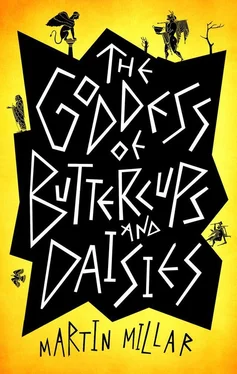‘I don’t know how it happened. One minute we were close to agreement, the next a frightful row broke out. Everyone was accusing everyone else of lies and treachery, and every agreement we’d made was being torn up and trampled in the dust. I’ve never seen anything like it.’
Nicias looked around at the small boys trotting along behind their tutors, the men pushing their carts of olives towards the market.
‘Aristophanes, have you noticed anything strange recently?’
‘Like what?’
‘I don’t know exactly… But people are starting to act oddly. It’s like there’s something in the air. Something bad.’
‘Ten years of war will do that.’
‘I know, but…’ Nicias gazed wistfully at the statues of Harmodius and Aristogeiton, in front of the law court at the edge of the agora. The city could do with more heroes like them. ‘People are acting out of character. It’s like the plague all over again.’
Aristophanes shuddered. It wasn’t that long since the terrible disease had ravaged Athens: only six or seven years since the last outbreak. They had been grim years, and he knew what Nicias meant about citizens acting out of character. There had been times, when the dead were strewn around unburied in the streets, and the dying lay helpless and alone in their houses, when all normal standards of decent behaviour seemed to have deserted Athens.
‘Please, Nicias, I saw my parents die. I don’t like to remember it. Things aren’t that bad yet.’
‘No, it’s not that bad. But it’s heading that way. Half the people I’ve talked to today seem to have taken leave of their senses.’ Nicias shook his head. ‘Maybe it is just the war. I hope your play is going well?’
Aristophanes shrugged, not wanting to describe his many theatrical worries. Nicias, however, seemed unusually interested in his progress, and pressed his enquiry.
‘It might be very helpful if you put on a great comedy dedicated to peace.’
‘Do you really think so?’
‘Certainly.’
Aristophanes was flattered. He’d never heard an important politician imply that his comedies might be of any importance. He regretted that he couldn’t give Nicias better news.
‘To be honest, it’s not going well. In fact we’re close to disaster.’
‘A successful comedy promoting peace might be just what Athens needs at this moment.’
‘I know. But it’s still a disaster.’
Bremusa had excellent night vision. It was an Amazon trait. Even as the moon began to disappear behind the clouds, she successfully avoided the pitfalls of the Athenian streets, guiding herself and Metris to the foot of the acropolis.
‘This should do, we’re close to the centre of the city. Time for you to act.’
Metris looked blank. ‘Act? Am I meant to act?’
‘I mean it’s time for you to locate Laet.’
The nymph continued to look blank.
‘Find Laet. That’s what the goddess sent you here for.’
‘Right.’ Metris looked at her sandals. She had small, delicate feet.
‘Well?’ Bremusa grew impatient. ‘Use your nymph magic to locate her.’
There was a long silence.
‘You do have powers of locating, don’t you? Like your mother?’
‘Well… not exactly,’ said Metris.
‘What do you mean “not exactly”? You said you had your mother’s gifts.’
‘I didn’t inherit absolutely all of them.’
Bremusa glared at Metris. ‘Are you telling me you can’t magically locate her?’
‘I’m afraid not.’
‘If we can’t even find Laet, how can you use your soothing nymph-powers to dispel her negative energy?’
The nymph shifted uncomfortably under Bremusa’s glare. ‘About that…’ She looked up. ‘Oh look, you can just see the Parthenon. Isn’t it lovely?’
‘Never mind the Parthenon! Are you telling me you can’t dispel negative energy?’
‘Not for powerful beings like Laet, no. Though I’m good with children. And cats always like me.’
‘Don’t talk to me about children and cats! You were sent here to perform a task and now you can’t do it! Have you been lying about everything?’
‘Of course not. You might just have got the wrong impression about a few things.’
Bremusa growled in frustration. ‘You can’t do the things you were brought here for! That’s not a wrong impression! That’s you making things up. I don’t believe you’re even the daughter of a river spirit. You probably just made that up too.’
‘I did not! I was Metricia’s favourite daughter. Second favourite. Third at the very least.’
Bremusa glared at her in the way she’d once glared at enemies on the battlefield. ‘Did you inherit any of your mother’s powers?’
‘Of course!’
‘Like what?’
‘I can make daisies and buttercups grow really quickly. Look!’
Metris waved her hand. Quite magically, a host of daisies and buttercups appeared at their feet. Standing amongst a small sea of flowers, the nymph seemed pleased with herself.
‘Aren’t they lovely?’
‘Lovely? Is that your only power? What use is that to anyone?’
Metris smiled cheerfully. ‘It always brightens things up.’
‘You idiot! No one cares about buttercups and daisies! That’s not going to save Athens. Why did you lie about your powers?’
‘I wanted to come to the festival… it’s draughty in my temple since it got ruined.’
‘I’ll ruin you, you —’
The Amazon broke off as four Scythian archers walked by; the night patrol, keeping order in the city. They looked over suspiciously, though their expressions softened when Metris smiled at them and gave them a cheerful wave.
‘The Goddess Athena is not going to be pleased with you,’ said Bremusa, when the archers had gone.
That didn’t seem to worry Metris. By now her attention had wandered to other matters. ‘I wonder why that young man was carrying all those penises?’
‘Probably because he was the local idiot.’
‘I thought he looked nice. Did you notice how nice his hair was? And he had nice eyes too.’
‘Stop saying “nice”. Nothing about him was nice.’
‘I hope we meet him again. He looked nice.’
Aristophanes was trying to sort out some problems in the chorus’s second-act choreography when young Luxos bounded into the rehearsal space, looking eager. Aristophanes left the chorus in the hands of Hermogenes and went over to talk to him.
‘Stop grinning at me in that offensive manner. What happened on your mission?’
‘I measured both your rivals’ phalluses. Leucon and Eupolis’s are much bigger. Good working order too, from what I could see. There’ll be some mighty erections on stage when they get going. Might be some sort of new record.’
The playwright scowled. It was bad news. Their producers were providing them with enough money for props, despite the hardships in Athens.
‘It’s because their plays are so bland. They get money because they never offend anyone. Damn them.’
Aristophanes hunted around for some coins to pay Luxos for his work. He noticed the young poet was still smiling. Aristophanes, burdened by worry, found this mildly irritating.
‘What are you so happy about?’
‘I’m in love.’
‘You’re always in love.’
‘This time it’s the real thing!’ gushed Luxos.
Aristophanes’ irritation increased. As if Luxos’s unceasing attempts to break into the refined world of Athenian poetry weren’t annoying enough, he was always falling in love as well, and he liked to talk about it.
‘Weren’t you already in love with Phryne the courtesan?’
Читать дальше












